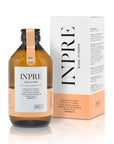



BONE VITAMIN
Vitamin D is one of the most influential regulators of calcium metabolism: as a result, bone-building cells (osteoblasts) build calcium into the bones, and high-strength, healthy bone tissue is formed. Vitamin D3 (cholecalciferol) is a precursor of vitamin D found in our foods of animal origin. Active vitamin D is formed from it with the cooperation of the liver and kidneys. The great advantage of using it as a vitamin supplement is that it is practically impossible to overdose. Because if the body is well supplied with active vitamin D, the excess will not be converted! In addition to the well-known effect of vitamin D in bone formation and thus in the prevention of osteoporosis, it also has many other hormone-like roles. It protects stem cells against mutations that occur during cell division and cell maturation. It "forces" mutant, degenerate cells to abort. Certain types of cancer have been proven to occur more frequently in vitamin D-deficient populations, and even among them, the tendency to cure and the response to traditional treatment are worse. It also contributes to the "armament" of T and B lymphocytes (immune cells): in the absence of vitamin D, the receptors with which they can recognize foreign microorganisms are not developed on the surface of these cells. In this case, the number of lymphocytes does not decrease, but their function is disturbed. Vitamin K is actually not a single compound, but a group of compounds. The role of vitamin K1 (phylloquinone) in blood coagulation is well known, while K2 (menaquinone-7) is more involved in bone metabolism: it reduces the loss of calcium through the kidneys through urine. This provides "building material" for bone-building cells and vitamin D. However, the physiological effects of vitamins K1 and K2 cannot be so sharply separated within the body. It is interesting that the human body is not able to produce any type of K vitamins, but it can convert the K1 and K2 vitamins taken in with food into each other as needed. Therefore, even with vitamin K2 administration, there is a real possibility of the appearance of vitamin K1, which can reduce the effect of oral blood thinning treatment. Certain malignant tumor diseases are also more common in cases of vitamin K deficiency. The physiological effects of vitamin A (also a group of compounds with several vitamin effects) are wide-ranging. Its role in the development of sharp vision - partly as an antioxidant and partly by "nursing" the visual cells - is well known. It is less known that it is essential for the growth of long bones: without it, the ossification of the growth cartilage can even stop. In children or adolescents, this can even be the cause of dwarfism. Furthermore, it is an important regulatory factor in the reproduction and development of all types of stem cells. Vitamin E is a powerful fat-soluble antioxidant. In many places, it protects living cells and membrane structures against the damaging effects of free radicals. It is particularly active where oxygen transport works (lung air sacs, pulmonary capillary vessels, cytochrome enzymes, etc.).
Natural vitamins and their preparations with traditional production technology can be absorbed and reach the target cells with considerable loss. D vitamins are approx. 40% is lost, 20-30% of K vitamins. This strongly depends on the type of food consumed at the same time, as well as the contents of the stomach and intestines. During liposomal production, the active ingredient particles are individually wrapped in a shell with a similar structure to the biological membranes of the body. Since this envelope has a similar structure to the cell walls, it dissolves in them and delivers its contents to the target cells without hindrance. 96% of the vitamins formulated in this way reach the target cells for utilization. Thanks to the outstanding bioavailability of the active ingredients of the BONE VITAMIN Liposomal Dietary Supplement, a daily dose of just one teaspoon ensures a complete replacement of these vitamins necessary for bone building.
According to recent surveys, it is primarily recommended as a vitamin supplement for adolescents and people over 60, but it also contributes to health maintenance in the following cases: Vitamin D supplement in the case of a vitamin D-deficient diet and lifestyle (dairy-poor diet, sunlight-deficient lifestyle). from young adulthood. To slow down the progress of osteoporosis and other ossification disorders. During the period of recovery from a bone fracture. To supplement the diet of chronic patients. To supplement the diet of people suffering from malignant diseases in preparation for treatment or during the recovery phase. For vitamin D supplementation in immunodeficient conditions.
It can be stored in its original sealed bottle in a dark place, protected from sunlight and radiant heat for one year. Expiry date indicated on the label. After opening, it is recommended to refrigerate and consume within 3 months. During long-term storage, sediment may form at the bottom, which does not affect the quality of the product. In this case, it should be gently shaken before filling. Keep out of the reach of small children.
The recommended dose is 5 ml once a day (measuring spoon included in the package or approx. one teaspoon). It has a pleasant pineapple flavor - so it can be consumed on its own or mixed with any liquid (drinking water, tea, juice, etc.). Do not mix with hot or alcoholic beverages. If you see sediment in the bottle before pouring, shake gently before opening! Do not exceed the recommended daily dose. A large overdose may cause transient bloating and spasmodic osmotic diarrhea. This does not require medical intervention. It is not advisable to relieve diarrhea with symptomatic drugs. The sooner the excess soy lecithin is eliminated, the sooner the complaint will disappear! It can only be taken at the same time as oral anticoagulant treatment after the information of the attending physician and based on his advice. In case of chronic medication, it can be taken according to the advice of the attending physician or pharmacist. Formulated for adults - not recommended for small children. Not recommended for pregnant and lactating mothers due to lack of knowledge! Consumption of the dietary supplement does not replace a varied, balanced diet and a healthy lifestyle. For general information purposes, the review was written by Dr. Dr. Csaba Gothárd, dietary supplement consultant. It is not used to assess or treat diseases. It is not a substitute for medical care.




